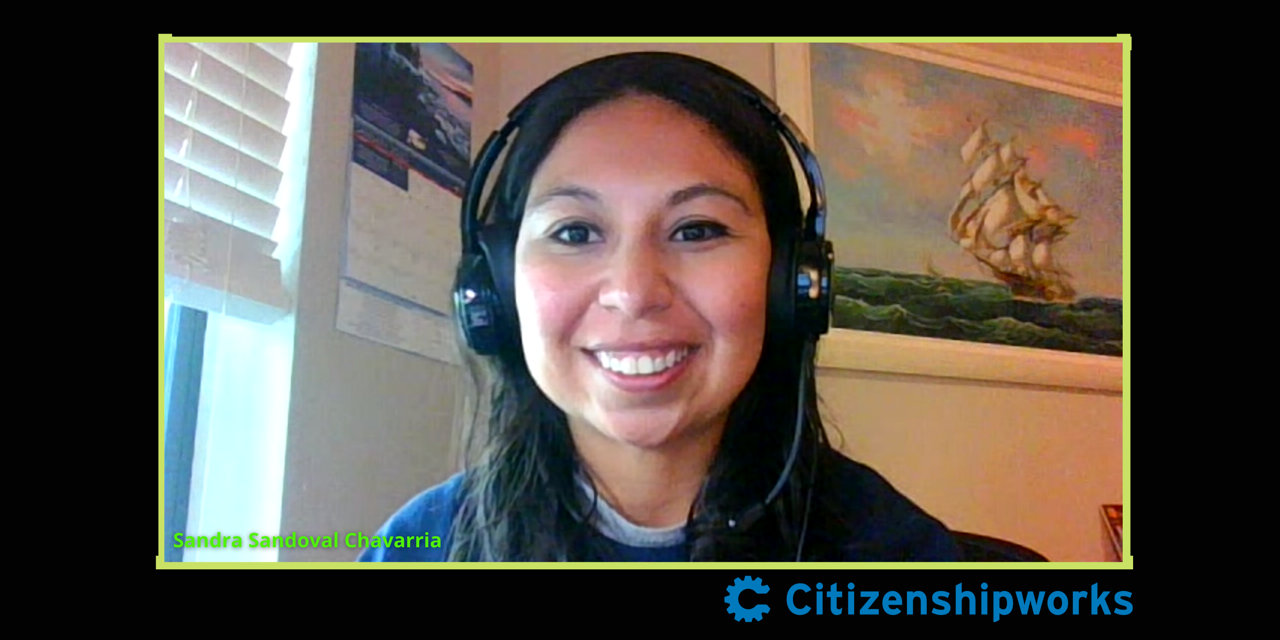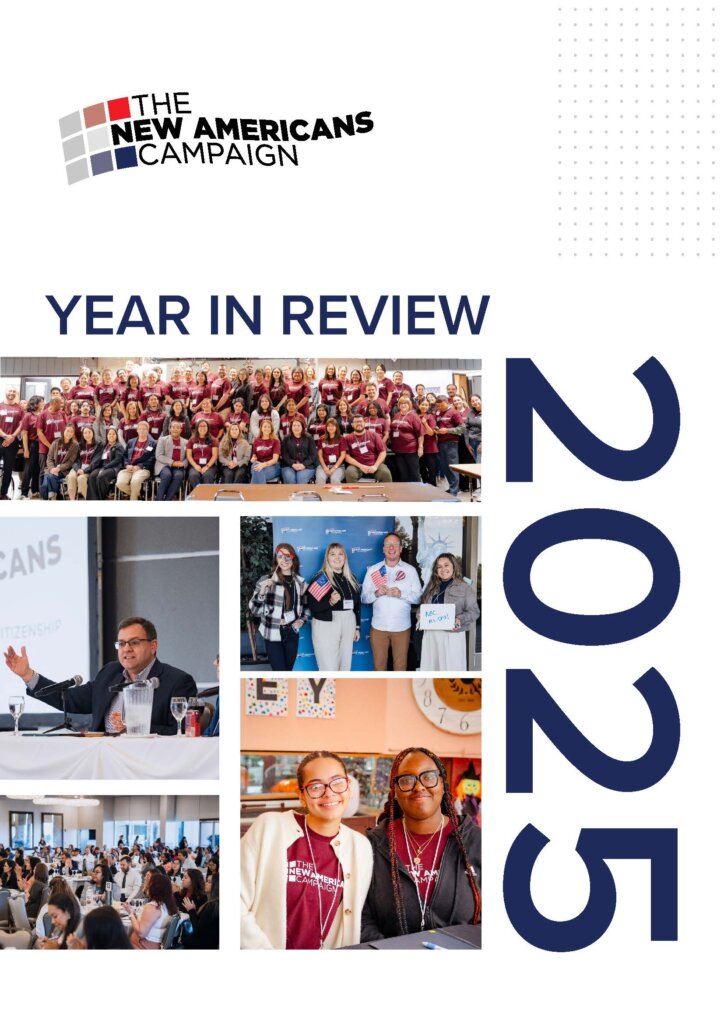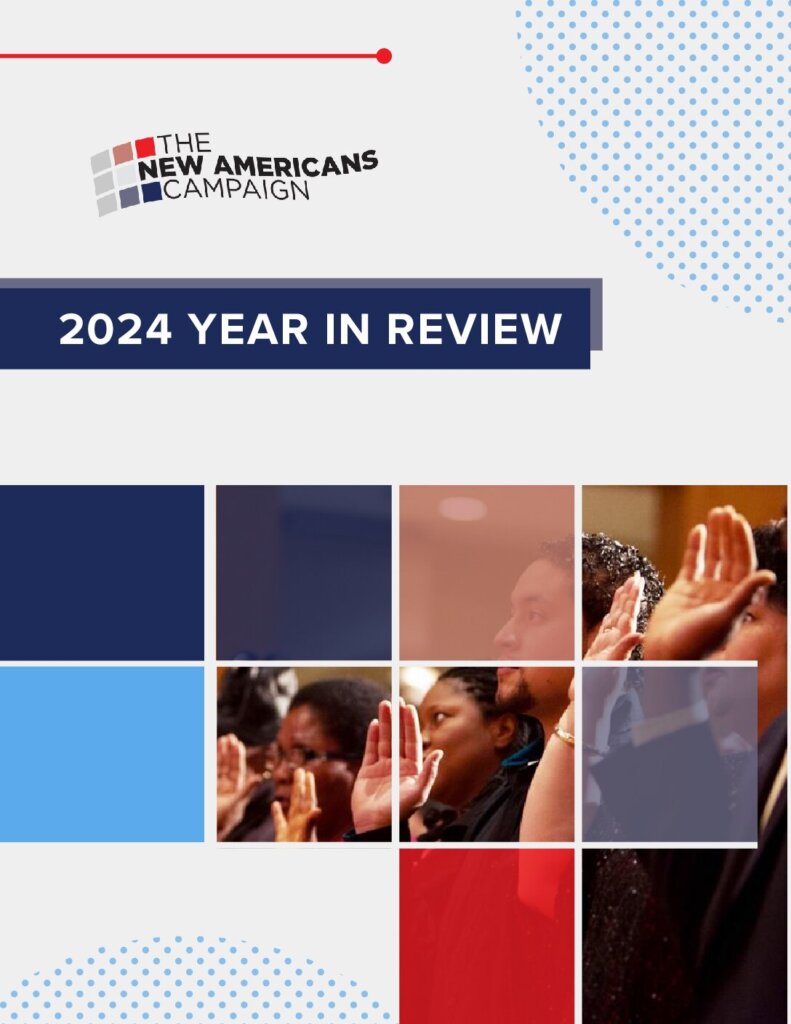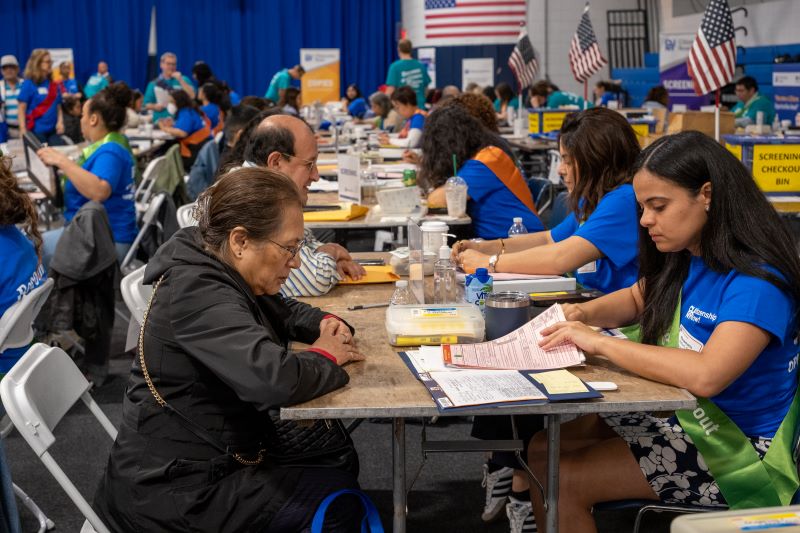Citizenshipworks: Virtual Review Pioneer

Explore more
The online platform Citizenshipworks was launched in 2011 to make applying for citizenship easier and more accessible. It was designed by three non-profits, Immigration Advocates Network, the Immigrant Legal Resource Center and Pro Bono Net, to provide in-person naturalization service providers with an online tool to help complete naturalization applications.
The world has turned upside down since then because of the
COVID-19 pandemic. While people shelter in place, remote legal services are the
only way to keep the naturalization momentum going. The Citizenshipworks
platform and team have been at the ready and in demand for the New Americans Campaign
partners. We reached out to Sandra Sandoval Chavarria, Citizenshipworks Program
Manager, to learn more about how the online platform is meeting this moment.
New Americans Campaign: How has the world of virtual
review changed from your perspective?
Sandra Sandoval Chavarria: We already had in place virtual review partners, Advancing Justice LA, GMHC, BPSOS, and several IRC offices. If someone starts an N-400 application online through Citizenshipworks and has a problem, we refer them to one of these partners who provide this remote service.
But we have seen changes. For example, there are a number of
folks that are coming in on their own. During regular times, it was usually
about a quarter to 30% of the visitors to the site. But during this COVID-19
period, about half of our traffic is made up of what we call DIY (do it
yourself) applicants. We will frequently refer them to a partner for legal
support. The other half of the traffic is from our partners who use
Citizenshipworks as the starting point for applicants.
New Americans Campaign: But now the world is completely
different. Are more partners reaching out to you?
Sandra Sandoval Chavarria: Yes. We hosted a series of
four webinars at the end of February and the beginning of March, where we
shared the experience of our virtual review partners. There were over a hundred
people who attended each of the sessions. Our partners have been really
creative with how they are using Citizenshipworks, or how they might change
their workflow. I think the pandemic has motivated partners to think about what
these remote services should look like.
We’ve always encouraged partners to think about a process in
which they provide some sort of service over the phone, whether it’s getting
people to start on Citizenshipworks, or to begin the application ahead of a
workshop event. That way, if a problem comes up, they can reach out beforehand.
New Americans Campaign: Do you have examples?
Sandra Sandoval Chavarria: One example that comes to mind is how the Immigrant Welcome Center in Indianapolis and the virtual review team at Asian Americans Advancing Justice-LA are working together. The Immigrant Welcome Center is a NAC affiliate who needed more remote legal capacity during this time. So, the Immigrant Welcome Center will help the applicant work their way through the application and then they will refer them to Carolyn Kim and her team at Advancing Justice for a final legal review and next steps.
We also have partners like Arkansas United who works with Michigan United. They’ve been a really good example of partners that have built their own workflows in which they incorporate volunteers. For people who might not be tech savvy, Arkansas United is able to help clients create their accounts over the phone and answer basic questions. Ultimately someone at Michigan United reviews the application. While aspects of Citizenshipworks and a workshop model worked really well, we are trying to replicate it in a way that works over the phone and still serves their populations.
New Americans Campaign: Since the pandemic began keeping
everyone at home, have you noticed changes in the ways that the lawful
permanent residents, themselves, are coming to Citizenshipworks, or accessing
and completing the N-400 form?
Sandra Sandoval Chavarria: We have always wondered
whether people would be hesitant about services delivered over the phone or
video. Since the pandemic, people are less hesitant than before. It may be
because they see their children going to school over Zoom, but I also think
they are more comfortable with getting services over the phone from a legal
partner. It makes sense to them now. We
give the applicant context, and we explain the process and the steps
toward completion. But there are still barriers. People don’t necessarily have
access to a printer, and maybe they don’t feel comfortable going to a FedEx.
The big barrier that we’re now facing, of course, is the upcoming increase in
the naturalization application fee. We hear people say, “I’ll just wait until
the office opens up again,” and we inform them they have to balance that
against waiting too long and paying a new, higher fee.
New Americans Campaign: Now that many people are becoming
acquainted with videoconferencing platforms like Zoom, how does the video
component on Citizenshipworks compare?
Sandra Sandoval Chavarria: You can certainly look at
each other by video on Citizenshipworks, but our platform doesn’t screen share.
We are looking at the needs of partners and taking notes and trying to figure
out what would add to the legal review experience, for example sharing
documents in real time. It’s something that we’ve continued to evolve. We are
lucky to be part of Pro Bono Net. They are always learning from their other
virtual services and that comes in handy when we think about legal consultation
as a whole.
New Americans Campaign: What is on your wish list moving
forward? Particularly now that Citizenshipworks has grown in importance as a
tool.
Sandra Sandoval Chavarria: For us, it would be
something to help leverage non-legal volunteers, who are perhaps on the phone,
helping an applicant complete their form. It might be separate accounts or a
breakout room that doesn’t need to link to Citizenshipworks accounts and
doesn’t need a password. This wasn’t necessary during an in-person workshop, but
volunteer accounts have become more important during quarantine. We’d like to
get the volunteers incorporated in a more official, systems-oriented way.
New Americans Campaign: What are some of the biggest
lessons that you think you’ve learned from this whole process?
Sandra Sandoval Chavarria: For me, it’s taking it
back to some of the basics. I think we did a good job when we started with our
webinar series about remote services. But looking back on it now, I might have
expanded the discussion of basic technology more. For example, when you encrypt
emails that you’re sharing, what does encryption mean? Our partners look to us
for that information because we do the technical work. I would also like to
simplify the definition of remote services. I think for applicants and partners
remote services sounds really abstract. Virtual review sounds even bigger and
more complex. It’s intimidating even though it may just mean that you can call
someone on the phone if you don’t have video.
New Americans Campaign: Is there a more inviting name for
virtual review?
Sandra Sandoval Chavarria: We go back and forth over
this. Apply from Home? Citizenship services in the palm of your hand? Over the
phone citizenship consultations? Most people either have a phone or maybe
someone in their household has a phone. You can create an account and access
Citizenshipworks with your phone. You don’t even need an email address. I think
the legal field has always been hesitant with new technology, but it’s been great
to see how NAC partners are open to new ideas and new ways of doing things.
There’s no single right way of doing remote assistance.
New Americans Campaign: Back to the LPRs themselves; is
there any myth busting you can do from the perspective of an applicant?
Sandra Sandoval Chavarria: We are finding ways to
connect people to technology during this time. Perhaps a relative or a friend
has a phone. We’ve also seen applicants who are being assisted by family
members. We’ve heard, “I’m helping my husband,” or “I need help from my
children.”
We’ve also tried to make Citizenshipworks as simple as possible. If you go to our website, there’s a little help button at the bottom of the page that leads to customer support for anybody needing help. I think we’ve seen applicants become more proactive around advocating for themselves, telling us they need help with some aspect of their case, and we can then refer them. I think in general, the idea of receiving services online for free sometimes feels like it’s too good to be true. Not all partners provide free services, some have a sliding scale, but many of our remote partners do provide their services for free. Also, I often find that a lot of people don’t know about the fee waiver. Many partners try to promote it, but the fee remains a big barrier. We sent out a message about the application fee increase and to let people know that they may qualify for a fee waiver.
New Americans Campaign: Citizenshipworks performs so well
for the N-400; I’ve heard practitioners wishing for it to work for the fee
waiver form as well. Is that on the horizon?
Sandra Sandoval Chavarria: It’s certainly been on the
horizon. But every time we’ve attempted to incorporate it, the fee waiver was
changing so we would decide to wait. It is something that we continue to
consider and hope to add to the site. It is something that partners would like
to see so we are working on ways to make it happen.
New Americans Campaign: When it comes to handling the new
challenges that came with this pandemic, what are your proudest of?
Sandra Sandoval Chavarria: I’m really proud of how we
were able to respond. As partners started closing their offices, a few people
reached out and we saw a wider need to respond. The pandemic also brought a
number of people back to Citizenshipworks, to join the conversation around
virtual assistance and how to serve specific populations.
I’m also really proud of the partners themselves. They began
taking chances, whether it was through Citizenshipworks or another platform.
I’ve heard from the field and from partners themselves about how hard it is to
rethink their own processes. We were able to step up to the plate to provide
tools, best practices, and other resources and to leverage our knowledge from
both Citizenshipworks and Pro Bono Net. What makes me really happy are some of
the partnerships and workflows that have emerged and that we’ve been able to
connect virtual review partners with community-based organizations that don’t
have legal capacity.
Read more:
Lessons from Our Virtual World Part One
Lessons from Our Virtual World Part Two
Lessons from Our Virtual World Part Three
Additional Resources:
Remote Legal Support: A Guide for Nonprofit and Pro Bono
Innovation



